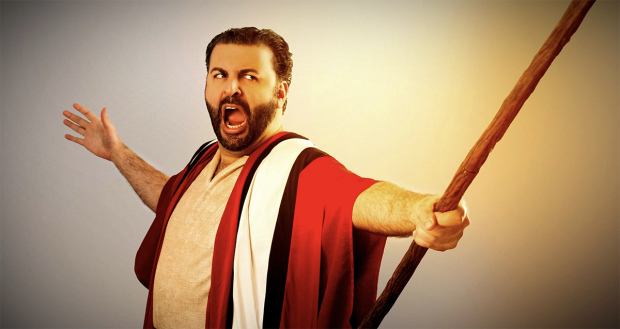Moses Parted the Red Sea but Ran Aground on Hollywood Boulevard
When it comes to biblical figures onstage, Jesus and Joseph are the big stars. Thanks to Andrew Lloyd Webber and Tim Rice, Jesus Christ Superstar and Joseph and the Amazing Technicolor Dreamcoat have racked up innumerable performances around the world, with the former playing more than 1,000 times on Broadway across four separate productions and the latter coming just shy of that mark in two runs. Jesus spread the word across a second show, of course, with Stephen Schwartz's Godspell playing over 800 times on Broadway and a miraculous 2,124 off-Broadway in its original run.
In comparison, the towering biblical figure of Moses hasn't been able to catch a break onstage, at least not in the modern era. Yes, he did well about 90 years ago in Marc Connelly's The Green Pastures, but the show is long out of favor. Despite the efforts of Franz Werfel and Kurt Weill in 1937 in The Eternal Road, the biblical patriarch doesn't have any tunes that, to quote Tom Lehrer's goals for popularizing Oedipus Rex, "the people could hum."

(© Robert Dennison)
That's not so say there haven't been efforts to center Moses in his own stage musical, or to be more accurate, an effort. In 2004, the three-year-old Kodak Theatre in Los Angeles (now the Dolby Theatre) was home to The Ten Commandments, an original musical that retold the story of the Jewish foster son of Egypt's leader who would go on to rediscover his heritage and lead his people from bondage. The idea was solid: The source material was plenty popular, and Cecil B. DeMille had adapted the story twice onscreen under that same title. A separate animated film musical, The Prince of Egypt, was a moderate box office success a few years earlier, boasting a score by Schwartz, back in biblical mode.
But the Los Angeles production of The Ten Commandments was wholly new: a sung-through musical in the JCS or Les Misérables vein, with a score by Patrick Leonard, a film composer and music producer best known at that time for his work with Madonna, and lyrics by Maribeth Derry, who had contributed songs to Rugrats in Paris and The Wedding Planner. The director was Robert Iscove, who had started his career as a choreographer, notably on the film of Jesus Christ Superstar, and directed and choreographed the 1979 Broadway production of Peter Pan, then had segued into work as an in-demand director of both episodic TV and made-for-television films. He directed the popular teen comedy She's All That and was just coming off directing the American Idol-inspired film From Justin to Kelly.
Perhaps the most intriguing member of the creative team was fashion designer Max Azria, who was not only responsible for the costumes, but also served as lead producer through his BCBGMaxAzria Entertainment Company. His partner in the company, Albert Cohen, was also credited for "original idea," though one suspects that avid readers of a certain good book going back several millennia might quarrel over where the idea really began.
While wags back in the day immediately began sharpening their knives when Val Kilmer was announced to play Moses, it's important to remember that it was not quite as odd as it may seem in retrospect. Kilmer began his career onstage, making his Broadway debut in his early 20s in the play Slab Boys, and he'd played both Jim Morrison in The Doors and the Elvis-inspired hero of Top Secret onscreen. He had voiced Moses in the earlier animated film as well, though his singing voice there was dubbed. The stage cast also included a then-unknown Adam Lambert, along with musical-theater stalwarts Lauren Kennedy and Luba Mason.
Nonetheless, when the extravaganza opened to great national attention in late September 2004, the Red Sea quickly came crashing down on those trying to traverse Hollywood Boulevard to success. In the New York Times, Charles Isherwood dubbed the show "a big, fat biblical boondoggle," while Mark Swed in the Los Angeles Times wrote of it as "2½ hours of cheesy stagecraft and innocuous, blaring upbeat music." On TheaterMania, Terri Roberts suggested that, "Apparently, the producers believe the tale itself is so well-known that there is no need for such trivialities as character identification, relationships, exposition, or dramatic tension."

(© Crossover Media)
The show ended up running less than two months and stands as a major US theatrical flop. Perhaps its fast fade is due in part to the fact that while being newly written and staged for the US, The Ten Commandments had its roots in a French version of the same story, Le Dix Commandements, that had reportedly been a success in Paris several years earlier, with Celine Dion even releasing a cover of one of its songs, "L'envie d'aimer" ("The Greatest Reward"). But unlike Les Miserables, which was translated to achieve its English-language success, the Élie Chouraqui-helmed version seen in France was almost completely discarded, though Chouraqui retained a "created and originally directed by" credit in Los Angeles.
That wholesale revision is why the version of The Ten Commandments that will play a five-performance run at New York's Center for Jewish History from May 5 to 15 can be accurately billed as the US premiere. With the original music by Pascal Obispo and lyrics by Lionel Florénce and Patrice Guirao, the new vest pocket version of a musical that claims to have been seen by 3 million audience members in Europe will feature English-language lyrics by David Serero, who is producing the show and plays the central role. Serero has released a single from his version, "The Maximum Pain."
Unlike the Los Angeles production which it inspired, the newest foray of The 10 Commandments to these shores is starting small. As befits the story of a leader whose journey began as a baby set onto a river's current for the hope of a better life, perhaps that's a wise choice for Moses yet again, at least when it comes to theater.










